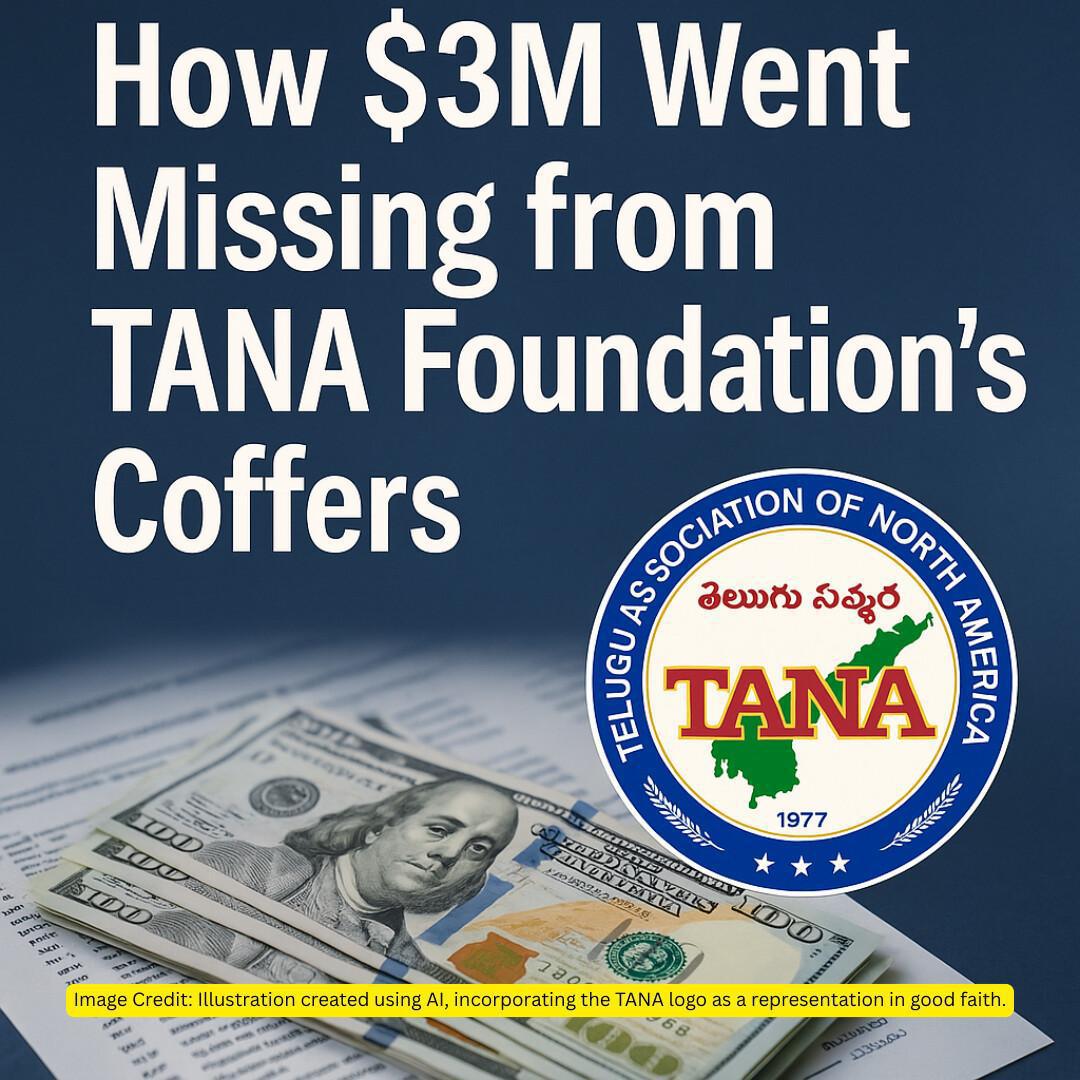An Explosive Financial Breach Shakes the Telugu Diaspora’s Trust
In a stunning revelation, the Telugu Association of North America (TANA) finds itself at the epicenter of a major controversy after its former Foundation Treasurer, Srikanth Polavarapu, confessed to diverting more than $3 million to his private firm, Bruhat Technologies.
Although TANA has acted swiftly to contain the damage, the scandal casts a long shadow over the governance and accountability practices of non-profit organizations—particularly those serving expatriate communities.
How One Decision Shook TANA
On November 23, 2024, the TANA Board of Directors convened an emergency session to confront the bombshell revelations of financial misconduct.
In an email confession, Polavarapu admitted to unilaterally redirecting funds totaling $3 million—without board consultation or authorization.
The leadership, under Chairman Dr. Nagendra Srinivas Kodali, responded immediately with a show-cause notice and announced intentions to pursue legal avenues to recover the lost funds.
The situation escalated as an internal review unearthed 29 suspicious transactions, all tied to the diverted sum. Another former TANA official, Venkata Ramana Yarlagadda, has also come under scrutiny and was summoned to appear at a critical board meeting scheduled for November 25, 2024, to address his possible involvement.
Federal Authorities Step In
The gravity of the situation attracted the attention of federal agencies. Reports indicate that the Federal Bureau of Investigation (FBI), Internal Revenue Service (IRS), and Department of Justice (DOJ) have jointly issued subpoenas to TANA, seeking detailed records of its operations from January 2019 to December 2024. This includes member details, fundraising efforts, bank transactions, and executive records.
Is History Repeating Itself?
This debacle has stirred memories of past financial scandals that have plagued similar organizations. The North America Telugu Association (NATA), once a prominent cultural body, was eventually dissolved under the weight of its own financial controversies.
The TANA case has reignited concerns about the structural vulnerabilities in diaspora-led organizations—where trust is high, but checks and balances are often weak. These environments, experts say, can be ripe for exploitation.
Worryingly, there have also been long-standing allegations that some non-profits, particularly within the Indian diaspora, have served as covert channels for money laundering—a concern particularly tied to influential individuals from Andhra Pradesh.
Experts Weigh In on TANA’s Path Forward
Chairman Dr. Kodali, seeking to reassure the community, reaffirmed the organization's stance:
“We are determined to recover the diverted funds and ensure such incidents never happen again. The trust of our members is paramount.”
Financial analyst Deepak Rao offered a wider lens:
“Incidents like these are unfortunately common across diaspora organizations. The lack of governance structures creates room for misuse. What we need is a paradigm shift in how such entities are managed.”
The Roots of a Crisis: TANA’s Legacy and Burden
For decades, TANA has served as a pillar of cultural identity for Telugu-speaking communities across North America, promoting social welfare, education, and heritage.
But this scandal is a critical blow—not just financially, but emotionally—for thousands who trusted the organization. The implications go beyond missing money; they cut deep into the credibility and future sustainability of TANA’s mission.
With other organizations like NATA having previously collapsed under similar strain, this incident underscores the need for stringent internal controls and possibly, third-party regulatory oversight.
Community Speaks: Anger, Anxiety, and a Demand for Change
Public sentiment has been divided. While some commend TANA’s prompt response, others are deeply disillusioned, voicing frustration over what they see as a failure of fundamental oversight.
Social media platforms have lit up with calls for independent audits, increased transparency, and even speculation about political connections tied to the misappropriated funds.
The episode has also reignited a long-standing debate within the Andhra community in the U.S.—around unity, caste-based divisions, and internal politics. Many are urging the community to focus on solving real issues rather than being torn apart by factionalism.
Turning Crisis Into Opportunity
TANA’s rapid moves—including show-cause notices, legal consultations, and internal investigations—reflect a desire to control the narrative and restore faith.
But the scandal lays bare the urgent need for stronger governance. Diaspora organizations must evolve beyond informal networks and charismatic leadership to establish rigorous systems of accountability.
As the Telugu community awaits the outcomes of the November 25 board meeting, one thing is clear: this crisis could serve as a defining moment.
If handled with integrity and transparency, it could spark reforms that not only rescue TANA’s image—but also uplift the entire ecosystem of cultural non-profits.
The time has come for these organizations to rise above dysfunction, foster true unity, and ensure they remain trusted custodians of culture and community for generations to come.


